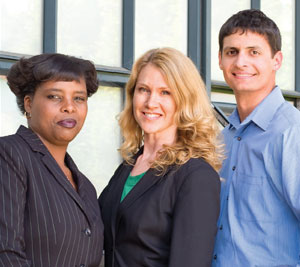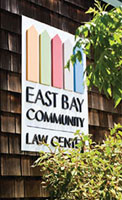To keep the water flowing for tenants in foreclosure, Boalt students at the East Bay Community Law Center tapped new strategies.

Berkeley tenant Melvin Green recalls visiting his landlord at her five-bedroom home in Livermore. As a courtesy, he took his shoes off before going inside. But, says the 51-year-old disabled army veteran, she failed to show similar courtesy when, in mid-March, Green found a foreclosure notice tacked to the door of his Sacramento Street apartment. No warning, no explanation from the landlord.
“I came home and was caught in a situation,” says Green. “It was bad. Hurtful. Stressful.” But this was only the beginning of his ordeal. A week and a half later, Green’s water was turned off. “It was very humiliating. All of a sudden you’re having to do things you’ve never had to do”—like showering and using the bathroom at an Oakland homeless shelter. “Mind-boggling,” Green says, “especially when you don’t know your rights and don’t have many options.”
Green may not have known his rights, but he did know about the East Bay Community Law Center (EBCLC), which provides free legal services to low-income residents in northern Alameda County. Founded by Boalt students in 1988, EBCLC is a community-based component of the law school’s clinical program. Rather than giving up and leaving like his two roommates had decided to do, Green sought EBCLC’s help.
Housing intake specialist Gracie Jones Whitaker—one of the center’s front-line service providers—was swift and effective. She called Green’s landlord and told her that if she couldn’t come up with a solution for the unpaid water bills, she’d refer the matter to small-claims court. The woman promptly settled with the East Bay Municipal Utility District (EBMUD) and, after two humiliating days of relying on the plumbing at the Howie Harp Center, Melvin Green was once again soaping up in his own shower.
Though a small skirmish in the larger battle for tenants’ rights, Jones Whitaker’s intervention on behalf of Green perfectly illustrates a central component of EBCLC’s mission: problem solving. Though it has a staff of full- and part-time attorneys—and, in any given semester, as many as four dozen neophyte lawyers in the form of clinical students—the Berkeley clinic is more than just an engine of litigation for the underresourced. “We’re always going to keep in mind what our clients are experiencing, and either open the door so they have a place at the table, or advocate for them,” says Tirien Steinbach ’99, the center’s executive director. “We try to look at things more as problem-solvers rather than as litigators.”
The recent epidemic of foreclosures nationwide has hit Alameda County particularly hard—Oakland saw over 15,000 foreclosure filings in the third quarter of 2008 alone—and ECBLC-style problem solving is in especially high demand these days. Throughout 2008, the center was inundated by pleas for help from tenants’ whose power, heat, and water was abruptly cut off. The student volunteers in EBCLC’s Housing Practice suddenly found themselves not only in the midst of client interviews and deposition taking, but also at the center of a maelstrom of sometimes contentious policy discussions among public agencies. That wasn’t where Gabe Podesta ’10, a member of the student team that addressed utility shutoffs in fall 2008, expected to be. But it gave them—and the tenants they were advocating for—a powerful voice. “Having a wider reach can result in a better long-term outcome for your client,” Podesta says.
But first, Podesta and his fellow students would have to get someone to listen.
Tenants Squeezed
It’s late morning, and bright light is filtering through the high windows of the carrel-crammed offices of EBCLC in South Berkeley. With its gray walls, gray carpet in the waiting area, and hushed air, it feels a bit like a dentist’s office. But, rather than extolling the benefits of flossing, a poster on the wall asks: “On probation? Off parole? YOU CAN VOTE! Even if you have a felony conviction. Register Now!” That, and Housing intake specialist Gracie Jones Whitaker’s voice suddenly breaking the quiet.“
I understand there’s illegal activity happening in this unit,” she says into the phone.
Jones Whitaker is speaking on behalf of a client, a gray-haired man standing at the reception desk. There’s mold creeping up the walls near his bed, and the landlord refuses to deal with it. “So you could have somebody come there and do the work, right?” she asks the landlord, in a tone that seems to leave little room for equivocation. “No, sir, there’s no way you can paint over mold. That’s gotta be a rip-out,” she says. The landlord speaks. “Can you put that in writing?” Jones Whitaker asks sharply. “When is that person going to come out and start that work?”
The man whose mold problem will soon be a thing of the past is one of about 20 clients Jones Whitaker will see on this day. She’ll also field between 60 and 70 calls from renters like him and like Melvin Green. The foreclosure crisis has added precipitously to what had already been a crushing demand for help—Oakland saw over 15,000 foreclosure filings in the third quarter of 2008 alone—causing EBCLC to institute a recent ban on drop-ins. Today, only clients with appointments will get to see someone.
 Between July 1, 2007, and June 30, 2008, the center’s Housing Practice—the largest of EBCLC’s five practices—served almost 4,000 clients. You might expect this year’s figure to exceed that. Except, of course, that the practice has only one Jones Whitaker, and a small handful of attorneys and a few dozen clinical students. “It doesn’t matter if a million people are seeking help,” says Housing Practice director Laura Lane ’96. “The demand for services always exceeds our ability to provide them.”
Between July 1, 2007, and June 30, 2008, the center’s Housing Practice—the largest of EBCLC’s five practices—served almost 4,000 clients. You might expect this year’s figure to exceed that. Except, of course, that the practice has only one Jones Whitaker, and a small handful of attorneys and a few dozen clinical students. “It doesn’t matter if a million people are seeking help,” says Housing Practice director Laura Lane ’96. “The demand for services always exceeds our ability to provide them.”
For the fiscal year ending June 2008, EBCLC received $1.6 million in grants and contract support, and just under $1 million in donations.
Tapped Out
Tenants who face eviction due to foreclosure live in an anguishing limbo of uncertainty and helplessness. Perhaps nothing better illustrates their vulnerability, and their need for advocacy from service providers like EBCLC, than the practice of utility shutoffs.
Here’s how it often plays out: When rental properties slip into foreclosure, financially strapped owners often leave behind a stack of unpaid utility bills. Banks or other financial institutions that find themselves titleholders may be unwilling to pay for lights and water, and utility companies are understandably eager to cut their losses. In single-unit properties, or in buildings where each unit has its own meter, tenants might be able to transfer service to their names (assuming they can come up with the deposits and processing fees). But in multi-unit buildings with a single meter, that’s rarely an option, since any one tenant is probably unwilling—if not financially unable—to assume responsibility for service to all units. So suddenly, without warning, the lights go out and the water stops—and often, as in Melvin Green’s case, an eviction notice goes up. In many cases a notice is unnecessary; a dwelling with no utilities is uninhabitable and a shutoff is just as good—or rather just as bad—as an eviction.
Before you say that there oughta be a law, rest assured that regulations exist. The California Public Utilities Code states that a utility provider must not cut service when “a public health or building officer certifies that termination would result in a significant threat to the health or safety of the residential occupants or the public.” What’s more, in Oakland and Berkeley, cities with Just Cause for Eviction ordinances, the simple fact of foreclosure can’t end an otherwise lawful tenancy. And in 1985, Gross v. Superior Court affirmed that renters who stay on in foreclosed properties do so under essentially the same terms—meaning that, if the previous landlord paid the water bill, the new landlord is obliged to do so, too.
But these new owners—what EBCLC staff attorney Marc Janowitz characterizes as financial institutions that are worldwide in their reach, generally represented by out-of-town legal counsel—don’t always play by local rules. “What we’ve found,” Janowitz says, “is that these financial institutions and their attorneys ignore these laws at will and are extremely reticent about spending any of their resources on anything such as keeping the utilities on.”
Throughout the summer and fall of 2008, amidst a growing clamor for help from East Bay renters, clinical students like Suzanne Martindale ’10 began to seek ways to put a permanent stop the practice.
The Memo That Roared
Fall 2008: Martindale’s first semester as a clinical student. After listening to scores of EBCLC clients relate stories she calls “infuriating,” it was clear that low-income East Bay tenants were facing a perfect storm of foreclosure-generated abuses.
Matindale describes the tenants’ predicament in much the same terms as Janowitz. “Many banks (especially if they are not headquartered in the Bay Area) do not know about the tenant protections in place in Berkeley or Oakland,” Martindale explained via email. “As a result, they post illegal notices telling tenants to move within 24 or 72 hours, or simply shut off the utilities. Banks have no interest in being landlords. They simply want to buy properties on the cheap so they can fix them up a bit and flip them at a higher price.”
When it came time to propose a final project, Martindale and her fellow clinicals wanted to do something big, tackle a seemingly intractable injustice that many clients had endured and many more would be likely to face. Stopping utility shutoffs seemed a no-brainer.
Says Podesta, one of Martindale’s student teammates, “Instead of doing it tenant by tenant, building by building, we thought of trying to come up with a bigger solution that would—hopefully—positively impact as many of the tenants as possible.” And the group wanted to devise not just a theoretical fix, but a solution with teeth.
It may be initially surprising to learn that the teeth-baring tactic was writing a memorandum. However, the memo was carefully crafted and targeted to begin a public conversation that could effectively end utility shutoffs. Or at least suspend them.
“One of our supervising attorneys tipped us off to the California Public Utilities Code,” Martindale recalled. The students found the clause about utilities’ obligation to keep the power and water on if a public official asserts health and safety reasons. And, Martindale says, “the PUC also provides that the utility has a cause of action against property owners who act or fail to act in such a way that causes termination of service.”
Bingo—the students had discovered a way for the utilities to collaborate with city attorneys to protect tenants. They drafted a four-page memo on EBCLC letterhead and, in early December, sent it to Andy Katz, a director on EBMUD’s publicly elected seven-member board. Far from accusing the utility of acting the villain, the memo’s wording is conciliatory. “Our goals are to maintain service to tenants and ensure that EBMUD may collect payment from the owner financial institutions,” it reads. “After careful consideration of the issues involved, we have come to the conclusion that achieving both is possible.”
Suzanne Martindale de- scribed the approach. “We demonstrated to EBMUD that, while they would have to comply with public officials’ orders when water service was ordered to remain on, they still had legal grounds to pursue delinquent banks.”
Katz, who represents District Four, which includes Berkeley and North Oakland, had already been working to put a shutoff moratorium in place. In March 2008, he’d sponsored a successful resolution designed to suspend water shutoffs in multifamily rental properties, with a six-step review process for each case. A second resolution kept the moratorium alive through September 2008.
That’s the date Katz was expecting legislation by Berkeley assembly member (now state senator) Loni Hancock to table shutoffs once and for all. But Governor Schwarzenegger vetoed AB1333, which would have given the district lien authority over foreclosed properties, a remedy for unpaid bills. At the time, Katz told the San Francisco Chronicle that, “with the governor’s veto, any option will require a tenant to take some action to continue water service.”
But, the same Chronicle story noted, Katz was looking into whether EBMUD could seek to collect the bills in small-claims court. And that’s precisely what EBCLC’s clinical students’ memo provided Katz and his fellow directors. At the same time, the students reached out to Oakland City Attorney John Russo, whom they’d worked with through Russo’s Neighborhood Law Corps, which does legal outreach to low-income Oakland residents. In essence, the students’ memo upped the incentive for the attorney’s office to work with EBMUD, to identify the financial institutions responsible for keeping renters’ utilities on.
It’s not as if EBCLC’s memo broke ground. Instead, it served as a kind of catalyst for cooperation among public agencies. “The conversation was already well under way,” notes EBCLC Housing director Lane. “EBMUD was actively looking for a way to not turn off people’s utilities.”
Today, Katz speaks of EBCLC as de facto partner. “I’ve always relied on the EBCLC as a helpful resource, and look forward to their help in protecting tenant rights.” Gabe Podesta seems somewhat awestruck. “We ended up working with the city attorney, with public utilities—groups you never thought would be a partner.”
A Mighty Trunk
Attorney Sheena Wadhawan had seen it all in Neighborhood Law Corps: the pregnant woman who had to haul heavy jugs of water from the corner liquor store back to her apartment, just so she could flush the toilet. The man desperate to get his electricity restored, since his wife depended on oxygen support. “Nothing more quickly deteriorates the quality of a family’s life than the lack of utilities,” says Wadhawan, an attorney in John Russo’s office.
Last December, two weeks after Martindale and Podesta’s team released their memorandum, the Oakland City Attorney’s office produced a declaration asking public utilities for the kind of shutoff moratorium Andy Katz had championed at EBMUD.
“Until December 31, 2010,” the declaration states, “neither East Bay Municipal Utility District nor Pacific Gas and Electric Company shall terminate the utilities at a tenant occupied foreclosed property where the owner was responsible for utility payments for the duration of 120 days from the date of the first notice provided to tenants at the address of service.”
“We asked for a limited amount of time—120 days—without a shutoff, to be reasonable,” Wadhawan explains. “To allow us time to figure out who the new owner is. We don’t want to completely burden the utilities, but just give us a window so we can sort things out.”
The attorney says PG&E has agreed, in spirit, to the moratorium. “We’re still talking with EBMUD,” she notes.
“We’re able to really bring folks to the table and get press around it,” Wadhawan says. “Create public pressure on the real estate and lender community not to do these shutoffs.” EBCLC, whose attorneys and students have been in constant communication with the City Attorney’s office, has been an essential partner. “Their housing authorities are incredible,” Wadhawan says. “The service they provide is so crucial to the community, I can’t imagine the suffering that would go on without them.”
The dialog between City Attorney and utility companies that EBCLC students helped spark has had an effect. Robbie Clark of Just Cause Oakland, a nonprofit advocacy group for low-income Oakland tenants, says that, since December, EBMUD’s service shutoffs have decreased dramatically. For the students involved, the shutoff initiative sparked something else.
“This exercise represented the best lesson that a clinical education provides,” says Gabe Podesta. “There’s this idea that lawyers prosecute cases, that the only way to get something done is through litigation. What I learned in the clinic is that an attorney should strive to be a problem-solver, sometimes through litigation, sometimes through other means.”
Executive director Tirien Steinbach ’99 says she’s been trying to come up with a tree metaphor to describe EBCLC’s role. “If there’s grassroots organizing and clients at the roots,” she says, “and at the top, the policy makers and policy advocates, then we’re the trunk, taking the nutrients—the wonderful ideas—from the roots all the way up to the branches and the leaves at the treetop. The trunk,” sh e adds, “is necessary for bringing all the various pieces together.”
e adds, “is necessary for bringing all the various pieces together.”
Meanwhile, Melvin Green is thinking about the impending auction of his foreclosed apartment. Sitting in an office chair in his living room—the only other seat is a plastic patio chair—he wonders what will happen to him if he’s forced to move. “I’d like to keep this place,” he says. “I don’t want to end up in no drug atmosphere, no rat- or roach-infested place. It’s bad for folks that are not well off. Society takes advantage of people who don’t know their rights.” You get the feeling that, one way or another, Green hasn’t turned to EBCLC for the last time.
By John Birdsall. John Birdsall is an independent journalist who lives in Oakland. He has written for San Francisco magazine, the East Bay Express, the San Francisco Chronicle, and the Contra Costa Times.
Back to Transcript